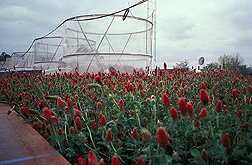This page has been archived and is being provided for reference purposes only. The page is no longer being updated, and therefore, links on the page may be invalid.
Read the magazine story to find out more. |
|
Farming Practices Influence the Effects of Rising Carbon Dioxide
By Laura McGinnisAugust 29, 2006
If atmospheric carbon dioxide (CO2) concentrations double within the next century, as some scientists predict, how should agriculture respond?
Agricultural Research Service (ARS) scientists in Auburn, Ala., are in the eighth year of a study to help answer this important question. At the ARS Soil Dynamics Research Unit, scientists are examining how different farm management practices can help store carbon in the soil, thus keeping it out of the air. Their research explores how increasing concentrations of atmospheric CO2 affect crops.
Plant pathologist G. Brett Runion is conducting the research with plant physiologist Stephen A. Prior and research leader H. Allen Torbert.
The scientists are using cylindrical, open-top field chambers to expose growing crops to varying levels of atmospheric CO2. Measurement of soil and plant responses to rising CO2 enables the scientists to understand how to manage agricultural systems to increase the amount of carbon stored in plant residues and soil.
Increased carbon storage has multiple benefits, such as reduced soil erosion and compaction, increased water-holding capacity for plants and a slower rise in atmospheric CO2 concentrations.
Runion is also using a system called ACES—for “automated carbon efflux system”—to track carbon as it flows from soil to atmosphere. Currently the group is using ACES to compare the effects of CO2 on conventional and conservation tillage systems for a sorghum-soybean crop rotation.
Read more about the research in the August 2006 issue of Agricultural Research magazine.
ARS is the U.S. Department of Agriculture’s chief scientific research agency.

